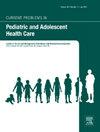Health disparities in food allergy
IF 3.7
4区 医学
Q1 PEDIATRICS
Current Problems in Pediatric and Adolescent Health Care
Pub Date : 2025-01-01
DOI:10.1016/j.cppeds.2025.101731
引用次数: 0
Abstract
Rates of food allergy are rising worldwide, with a disproportionate amount of disease burden found in patients of Black, Asian, and Latinx descent. Recent guidelines have recommended early introduction of allergens as early as 4-months-old to mitigate the development of food allergy. However, non-White children continue to have significantly poorer outcomes with higher rates of food allergy-related emergency department visits for anaphylaxis without having equivalent access to epinephrine auto-injectors. With only half of allergists accepting Medicaid in the United States, and only one-third of Medicaid-enrolled children with food allergies having seen an allergist, underserved populations are less likely to have access to subspecialty care — a major determining factor in allergy health outcomes. In this review, we examine the health disparities that contribute to food allergy as well as possible solutions for physicians to combat inequity in allergy care.
食物过敏的健康差异。
世界范围内的食物过敏率正在上升,黑人、亚洲人和拉丁裔患者的疾病负担不成比例。最近的指南建议早在4个月大时就引入过敏原,以减轻食物过敏的发展。然而,非白人儿童的结果仍然明显较差,在没有同等机会获得肾上腺素自动注射器的情况下,因食物过敏相关的过敏反应急诊就诊率较高。在美国,只有一半的过敏症专科医生接受医疗补助,只有三分之一的参加医疗补助的食物过敏儿童看过过敏症专科医生,服务不足的人群不太可能获得亚专科护理——这是过敏症健康结果的一个主要决定因素。在这篇综述中,我们研究了导致食物过敏的健康差异,以及医生应对过敏护理不平等的可能解决方案。
本文章由计算机程序翻译,如有差异,请以英文原文为准。
求助全文
约1分钟内获得全文
求助全文
来源期刊
CiteScore
4.60
自引率
0.00%
发文量
61
审稿时长
5 days
期刊介绍:
Recognized for its probing, comprehensive, and evidence-based reviews, Current Problems in Pediatric and Adolescent Health Care devotes each issue to a timely and practical topic in pediatric medicine, presented by leading authorities in the field. The journal offers readers easily accessible information that enhances professional experience and is pertinent to daily pediatric practice. Each issue''s review article is accompanied by an additional special feature designed to highlight a particular aspect of the topic presented.

 求助内容:
求助内容: 应助结果提醒方式:
应助结果提醒方式:


